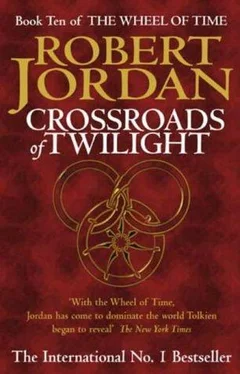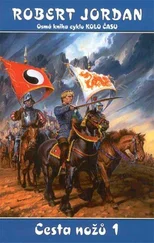“That won’t be necessary,” Mat said after a moment. Only a moment. However satisfying it might be to have Joline “settled down,” Edesina might draw that knife, and that would set the cat among the chickens no matter how it turned out. “What greater danger are you talking about, Joline? Joline? What danger is greater than the Seanchan right now?”
The Green decided her stare was making no impression on Bethamin and turned it on Mat, instead. Had she been other than Aes Sedai, he would have said she looked sulky. Joline disliked explaining. “If you must know, someone is channeling.” Teslyn and Edesina nodded, the Red sister reluctantly, the Yellow emphatically.
“In the camp?” he said in alarm. His right hand rose on its own to press against the silver foxhead under his shirt, but the medallion had not turned cold.
“Far away,” Joline replied, still unwilling. “To the north.”
“Much farther than any of us should be able to sense channeling,” Edesina put in, a touch of fear in her voice. “The amount of saidar being wielded must be immense, inconceivable.” She fell silent at a sharp glance from Joline, who turned back to study Mat as though deciding how much she had to tell him.
“At that distance,” she went on, “we wouldn’t be able to feel every sister in the Tower channeling. It has to be the Forsaken, and whatever they’re doing, we do not want to be any closer than we can avoid.”
Mat was still for a moment; then finally, he said, “If it’s far, then we stick with the plan.”
Joline went on arguing, but he did not bother to listen. Whenever he thought of Rand or Perrin, colors swirled in his head. A part of being ta’veren, he supposed. This time, he had not thought of either of his friends, but the colors had suddenly been there, a fan of a thousand rainbows. This time, they had almost formed an image, a vague impression that might have been a man and a woman seated on the ground facing one another. It was gone in an instant, but he knew as surely as he knew his name. Not the Forsaken. Rand. And he could not help wondering, what had Rand been doing when the dice stopped?
Furyk Karede sat staring at his writing table without seeing the papers and maps spread out in front of him. Both of his oil lamps were lit and sitting on the table, but he no longer had need of them. The sun must be rimming the horizon, yet since waking from a fitful sleep and saying his devotions to the Empress, might she live forever, he had only donned his robe, in the dark Imperial green that some insisted on calling black, and sat here without moving since. He had not even shaved. The rain had stopped, and he considered telling his servant Ajimbura to swing a window open for a little fresh air in his room at The Wandering Woman. Clean air might clear his head. But over the last five days there had been lulls in the rain that ended with sudden drenching downpours, and his bed was located between the windows. He had needed to have his mattress and bedding hung in the kitchen to dry once already.
A tiny squeal and a pleased grunt from Ajimbura made him look up to find the wiry little man displaying a limp rat half the size of a cat on the end of his long knife. It was not the first Ajimbura had killed in this room recently, something Karede believed would not have happened if Setalle Anan still owned the inn, though the number of rats in Ebou Dar seemed to be increasing well in advance of spring. Ajimbura looked a little like a wizened rat himself, his grin both satisfied and feral. After more than three hundred years under the Empire, the Kaensada hill tribes were only half civilized, and less than half tamed. The man wore his white-streaked dark red hair in a thick braid that hung to his waist, to make a good trophy if he ever found his way back to those near-mountains and fell in one of the endless feuds between families or tribes, and he insisted on drinking from a silver-mounted cup that anyone who looked closely could see was the top of someone’s skull.
“If you are going to eat that,” Karede said as though there were any question, “you will clean it in the stableyard out of anyone’s sight.” Ajimbura would eat anything except for lizards, which were forbidden to his tribe for some reason he would never make clear.
“But of course, high one,” the man replied with the hunch of his shoulders that passed for a bow among his people. “I know well the ways of the townspeople, and I would not embarrass the high one.” After close to twenty years in Karede’s service, without a reminder he still would have skinned out the rat and roasted it over the flames in the small brick fireplace.
Scraping the carcass off the blade into a small canvas sack, Ajimbura tucked that into a corner for later and carefully wiped his knife clean before sheathing it and settling on his heels to await Karede’s needs. He would wait like that all day, if necessary, as patiently as a da’covale. Karede had never puzzled out exactly why Ajimbura had left his hill fort home to follow one of the Deathwatch Guard. It was a much more circumscribed life than the man had known before, and besides, Karede had nearly killed him three times before he made that choice.
Dismissing thoughts of his servant, he returned to the display on his writing table, though he had no intention of taking up his pen for the moment. He had been raised to banner-general for achieving some small success in the battles with the Asha’man, in days when few had achieved any, and now, because he had commanded against men who could channel, some thought he must have wisdom to share about fighting marath’damane. No one had had to do that in centuries, and since the so-called Aes Sedai revealed their unknown weapon only a few leagues from where he sat, a great deal of thinking had gone into how to cripple their power. That was not the only request littering the tabletop. Aside from the usual run of requisitions and reports that needed his signature, his comments on the forces arrayed against them in Illian had been solicited by four lords and three ladies, and on the special Aiel problem by six ladies and five lords, but those questions would be decided elsewhere, very likely already had been decided. His observations would only be used in the infighting over who controlled what in the Return. In any event, war had always been a second calling for the Deathwatch Guard. Oh, the Guards were always there whenever a major battle was fought, the swordhand of the Empress, might she live forever, to strike at her enemies whether or not she herself was present, always to lead the way where the fight was hottest, but their first calling was to protect the lives and persons of the Imperial family. With their own lives, when necessary, and willingly given. And nine nights past, the High Lady Tuon had vanished as if swallowed by the storm. He did not think of her as the Daughter of the Nine Moons, could not until he knew she was no longer under the veil.
He had not considered taking his own life, either, though the shame cut him keenly. It was for the Blood to resort to the easy way to escape disgrace; the Deathwatch Guard fought to the last. Musenge commanded her personal bodyguard, but as the highest-ranking member of the Guard this side of the Aryth Ocean, it was Karede’s duty to return her safely. Every cranny in the city was being searched on one excuse or another, every vessel larger than a rowboat, but most often by men ignorant of what they were searching for, unaware that the fate of the Return might rest on their diligence. The duty was his. Of course, the Imperial family was given to even more complicated intrigues than the rest of the Blood, and the High Lady Tuon frequently played a very deep game indeed, with a sharp and deadly skill. Only a few were aware that she had vanished twice before, and had been reported dead, to the very arrangement of her funeral rites, all by her own contriving. Whatever the reasons for her disappearance, though, he had to find and protect her. So far he had no clue how. Swallowed by the storm. Or perhaps by the Lady of the Shadows. There had been countless attempts to kidnap or assassinate her, beginning on the day of her birth. If he found her dead, he must find who had killed her, who had given the ultimate commands, and avenge her whatever the cost. That was his duty, too.
Читать дальше












